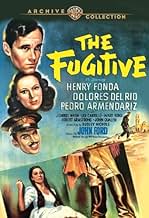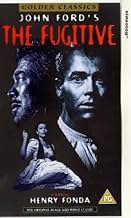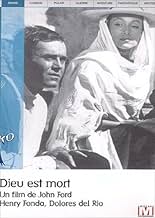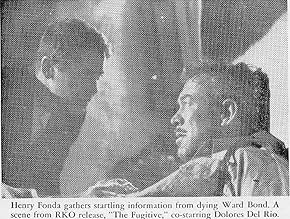IMDb RATING
6.3/10
2.7K
YOUR RATING
Anti-Catholic and anti-cleric policies in the Mexican state of Tabasco lead the revolutionary government to persecute the state's last remaining priest.Anti-Catholic and anti-cleric policies in the Mexican state of Tabasco lead the revolutionary government to persecute the state's last remaining priest.Anti-Catholic and anti-cleric policies in the Mexican state of Tabasco lead the revolutionary government to persecute the state's last remaining priest.
- Awards
- 1 win & 2 nominations
Dolores Del Río
- An Indian Woman
- (as Dolores Del Rio)
Pedro Armendáriz
- A Lieutenant of Police
- (as Pedro Armendariz)
Chris-Pin Martin
- An Organ-Grinder
- (as Cris-Pin Martin)
Miguel Inclán
- A Hostage
- (as Miguel Inclan)
Fernando Fernández
- A Singer
- (as Fernando Fernandez)
Rodolfo Acosta
- Policeman
- (uncredited)
Mel Ferrer
- Father Serra
- (uncredited)
Jack Pennick
- Man
- (uncredited)
José Torvay
- Mexican
- (uncredited)
- Directors
- Writers
- All cast & crew
- Production, box office & more at IMDbPro
Storyline
Did you know
- GoofsWhen the Priest is on line getting ready to board a ship, he is approached by a young boy that was baptized by him. The boy informs him that his mother is dying and wishes for the priest to come home with him to give her the last rites. What is not explained is how did the boy just happen to know that the priest was in town and getting ready to board a ship at that precise moment and in the third class section.
- Quotes
A Police Informer: [to the priest] He's dying, Father. He wants you to come. You cannot refuse a man who is dying, Father. He has so much to confess.
- ConnectionsFeatured in John Ford (1992)
- SoundtracksBury Me Not on the Lone Prairie
("The Dying Cowboy") (uncredited)
American folk ballad based on an older sea song (1932)
Variation heard as theme for the Gringo (Ward Bond)
Featured review
There are essentially two ways in which to view this movie.
The first one is to compare and contrast this film with the novel from which it is loosely inspired, "The Power and the Glory" by Graham Greene. This would unfortunately lead to disappointment and a poor understanding of John Ford's motives in making this movie. While the characters and situation are indeed taken from the book, The Fugitive is radically different, not just in the manner in which the main characters are treated, but more importantly, in the message it carries. While Greene's masterpiece described how even the most outwardly depraved and despicable of human beings can be redeemed by their last actions of faith and sacrifice, John Ford was more concerned with showing how circumstances may transform a cowardly priest into a martyr for the faith. While these two themes may be related, they reveal a difference in their respective author's world view and understanding of faith and redemption. It may be argued that the code of those days would not have permitted the showing of an alcoholic and adulterous priest on screen, but this would be misunderstanding the fundamental philosophy of John Ford, whose relatively conservative views in matters of morality would have recoiled at such an idea.
This brings us to the second way in which this movie can be enjoyed and appreciated, namely as John Ford's labour of love and guilty pleasure. It has been said that, of all the masterpieces he created with Henry Fonda and others, and there were many, The Fugitive was one of his all-time personal favorites, even though it was never a popular, nor critical success. Ford projected in his version of the story many of his personal trips regarding his faith. Allegories, and barely subtle Christ references abound in this movie, though never in a simple, nor trite manner. Rather, it is a beautifully-made story of a man's journey from fear and doubt to a better understanding of his role, no matter how modest, in the grand affairs of the world.
The photography is truly a work of art, masterfully using light and shadows, brightness and dark, close-ups of faces distorted by anguish and halos of figures resembling statues in church alcoves. Fonda's performance, always perfect, reaches new heights here. His mastery at containing emotions, while letting them seep through the audience, undiluted, gives this particular characterization extraordinary strength and complexity. It would have been tempting to interpret the priest as an almost static character, given the subject matter. Instead, while his priest was neither alcoholic, nor adulterous, he displays an even greater weakness and flaw of character: lack of faith, profound self-doubt and abject cowardice. His fears, doubts and anguish and his gradual descent into debasement, are in many ways more disturbing since they are in direct conflict with the sacrifices and moral strength demanded of a priest during religious persecution.
Dolores del Rio is magnificent in her Mary-Magdalena characterization, as Pedro Amendariz, superb as the perennial Judas torn by love, hate, jealousy, and fear. There is very little dialogue, and unlike many of Ford's movie, very little of the usual comic relief which often balances dramatic moments. Yet, there is never a dull or unnecessary scene.
John Ford has crafted in this movie something better than a faithful rendition of "The Power and The Glory". Indeed, The Fugitive is a beautiful, heartfelt story about humanity's frailty and its struggle to find strength and redemption in times of crisis. In this sense it is after all a wonderful tribute to Graham Greene's novel.
The first one is to compare and contrast this film with the novel from which it is loosely inspired, "The Power and the Glory" by Graham Greene. This would unfortunately lead to disappointment and a poor understanding of John Ford's motives in making this movie. While the characters and situation are indeed taken from the book, The Fugitive is radically different, not just in the manner in which the main characters are treated, but more importantly, in the message it carries. While Greene's masterpiece described how even the most outwardly depraved and despicable of human beings can be redeemed by their last actions of faith and sacrifice, John Ford was more concerned with showing how circumstances may transform a cowardly priest into a martyr for the faith. While these two themes may be related, they reveal a difference in their respective author's world view and understanding of faith and redemption. It may be argued that the code of those days would not have permitted the showing of an alcoholic and adulterous priest on screen, but this would be misunderstanding the fundamental philosophy of John Ford, whose relatively conservative views in matters of morality would have recoiled at such an idea.
This brings us to the second way in which this movie can be enjoyed and appreciated, namely as John Ford's labour of love and guilty pleasure. It has been said that, of all the masterpieces he created with Henry Fonda and others, and there were many, The Fugitive was one of his all-time personal favorites, even though it was never a popular, nor critical success. Ford projected in his version of the story many of his personal trips regarding his faith. Allegories, and barely subtle Christ references abound in this movie, though never in a simple, nor trite manner. Rather, it is a beautifully-made story of a man's journey from fear and doubt to a better understanding of his role, no matter how modest, in the grand affairs of the world.
The photography is truly a work of art, masterfully using light and shadows, brightness and dark, close-ups of faces distorted by anguish and halos of figures resembling statues in church alcoves. Fonda's performance, always perfect, reaches new heights here. His mastery at containing emotions, while letting them seep through the audience, undiluted, gives this particular characterization extraordinary strength and complexity. It would have been tempting to interpret the priest as an almost static character, given the subject matter. Instead, while his priest was neither alcoholic, nor adulterous, he displays an even greater weakness and flaw of character: lack of faith, profound self-doubt and abject cowardice. His fears, doubts and anguish and his gradual descent into debasement, are in many ways more disturbing since they are in direct conflict with the sacrifices and moral strength demanded of a priest during religious persecution.
Dolores del Rio is magnificent in her Mary-Magdalena characterization, as Pedro Amendariz, superb as the perennial Judas torn by love, hate, jealousy, and fear. There is very little dialogue, and unlike many of Ford's movie, very little of the usual comic relief which often balances dramatic moments. Yet, there is never a dull or unnecessary scene.
John Ford has crafted in this movie something better than a faithful rendition of "The Power and The Glory". Indeed, The Fugitive is a beautiful, heartfelt story about humanity's frailty and its struggle to find strength and redemption in times of crisis. In this sense it is after all a wonderful tribute to Graham Greene's novel.
- laurence_dang
- Jun 10, 2003
- Permalink
- How long is The Fugitive?Powered by Alexa
Details
Box office
- Budget
- $1,500,000 (estimated)
- Runtime1 hour 44 minutes
- Color
- Aspect ratio
- 1.37 : 1
Contribute to this page
Suggest an edit or add missing content






































